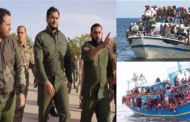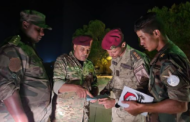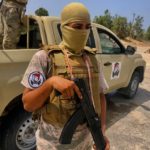MAIN EVENTS OF THE WEEK
On November 10, gunmen killed lawyer and activist Hanan al-Barasi in downtown Benghazi, prompting universal criticism and condemnation.
On November 10, Libyan Media Organization Mohamed chief Omar Baiyu was released by the GNA-recognized Tripoli Revolutionaries Brigade who had kidnapped him.
On November 14, a security team from Turkey landed in Tripoli ahead of Turkish President Erdogan’s imminent visit to Libya. The same day, Libyan Defence Minister Al-Namroush met with his Turkish counterpart in Istanbul;
The Dialogue Forum in Tunis has concluded another week of talks with two important decisions: scheduling general elections for December 24, 2021, and devising the candidacy mechanism to select leading positions in the next phase.
AL-RUWAIS
- on November 14, GECOL reported that an armed group had attacked the Al-Ruwais power station, beating the operators and forcing them to disconnect some of the main lines. The attackers also opened fire on the electrical equipment, damaging it.
BENGHAZI
- on November 12, the LNA announced the deployment of its military units to help the Interior Ministry enforce law and order in Benghazi, based on a security plan launched by the Joint Security Committee at the directions of LNA General Commander, Field Marshal Khalifa Haftar;
- on November 11, Field Marshal Haftar ordered the security authorities to identify and arrest the murderers of Hanan al-Barasi, who was assassinated the day before in Benghazi;
- on November 10, gunmen killed lawyer and activist Hanan al-Barasi in downtown Benghazi. She had received multiple death threats for criticizing the corruption and greed of Haftar’s officials in the city. Despite being a staunch Haftar supporter, Al-Barasi had started a critical campaign targeting his son Saddam’s military promotion and his family’s newly-gained wealth. Just a day before Al-Barasi’s death, her daughter had escaped an attempt on her life.

JUFRA – SIRTE
- on November 10, the Volcano of Rage Operation (VRO) stated that a new group of Wagner mercenaries had been reinforcing their positions and installing a new radar in the area near Al-Batuma, west of Sirte.
KHOMS – SORMAN
- on November 12, around a hundred migrants died in two shipwrecks off the Libyan coast near Khoms and Sorman. Many others were rescued by local fishermen and the Coast Guard. International bodies and various NGOs expressed sorrow for the tragedy and called on the EU to review its approach to migration from Libya.

MISRATA
- on November 9, Misrata Municipal Council announced the reopening of the Dafniya checkpoint, west of the city, after wounded fighters had closed it for several hours in protest demanding medical treatment.
TRIPOLI
- on the evening of November 14, a security team featuring members of the Turkish Special Forces reportedly arrived in Tripoli aboard two military aircraft ahead of Turkish President Erdogan’s imminent visit to Libya, during which he is expected to meet the Turkish forces stationed in the country, particularly in Misrata;
- on November 10, the Attorney General’s Office ordered the detention of the former director of the Financial Affairs Department at the Ministry of Interior, following the detention of two former members of the Procurement Committee at the Ministry of Interior during 2013 and 2014 on charges of squandering public funds;
- Mohamed Omar Baiyu, Head of the Tripoli-based Libyan Media Organization, was released on November 10. In a social media post, he said his arrest was ‘‘a misunderstanding’’ between him and the GNA-recognized Tripoli Revolutionaries Brigade who kidnapped him.
INTERNATIONAL RELATIONS
- on November 15, the Head of the Forza Italia Party, Antonio Tajani, said that the detention of 18 Italian fishermen in Libya by members of military militias in eastern Libya for more than two months is totally unacceptable;
- on November 15, Germany’s ambassador to Libya, Oliver Owcza encouraged Libyan Political Dialogue Forum delegates to “redouble their efforts” and agree on a “new, interim executive structure”;
- on November 15, 17 Libyan women participating in the Libyan Political Dialogue Forum (LPDF) in Tunisia demanded in a joint statement to allocate one of the two deputy prime minister posts to a woman and promote female participation in Libya’s political life;
- on November 15, the UNSMIL rejected a motion by LPDF participants to establish a separate electoral college for each of Libya’s three main regions;
- on November 14, the House of Representatives, the High Council of State, and the Constituent Drafting Body demanded the UNSMIL to support the constitutional process and help clear the way for a constitutional referendum;
- on November 14, EU ambassador to Libya, José Sabadell hailed the agreement made LPDF delegates in Tunis to hold elections on December 24, 2021, Libya’s Independence Day;
- on November 14, Tunisian Prime Minister, Hicham El Mechichi said that given the close relationship between Tunisia and Libya, another closure of the Ras Ajdir border crossing must be avoided, and therefore, all precautions must be adopted to prevent any further spread of the novel coronavirus;
- on November 14, Libyan Defence Minister Al-Namroush met with his Turkish counterpart, Hulusi Akar, in Istanbul for talks on the latest developments in Libya. “Turkey is closely following the negotiations for a political solution in Libya,” Akar said, reaffirming that the Turkish army will continue to provide training, support, and consultancies to their “Libyan brothers”;
- on November 13, LPDF participants agreed to hold constitutionally-based elections on December 24, 2021, Libya’s Independence Day;
- on November 12, the UN and Germany signed a USD 2m contract to support the LPDF currently taking place in Tunisia;
- on November 12, the 5 + 5 Joint Military Committee concluded its meetings in Sirte with a roadmap for the return of GNA-sponsored fighters to Tripoli, and of the LNA to Benghazi. The committee underscored that all mercenaries must leave Libyan territories;

- on November 12, a nomination mechanism for the new presidential council and the new government was devised by the LPDF in Tunisia;
- on November 10, the United Nations Humanitarian Coordinator for Libya, Yacoub El Hillo, condemned the killing of a 15-year-old Eritrean asylum seeker in a shelter in Tripoli;
- GNA Defense Minister, Salah al-Din al-Namroush, and his Qatari counterpart, Khalid bin Mohammad Al Attiyah, signed a security deal to provide training and consultations for GNA’s military forces, and to establish a Qatari air military base in Misrata for the first time in the history of the two countries;
- on November 11, the Defense Ministries of the Libyan GNA and Qatar signed a cooperation protocol for training and building capabilities as well as exchange of expertise to benefit from the experience of the Qatari ministry;

- on November 11, GNA Defense Minister A-Namroush met in Doha with his Italian counterpart, Lorenzo Guerini, to discuss defense cooperation as well as “mechanisms for enhancing cooperation” between GNA and Italy in various fields, especially with regard to “search and rescue operations in the Mediterranean and support for GNA’s Navy”;

- on November 11, the LPDF Tunis approved the UNSMIL’s roadmap whereby a new interim three-person Presidency Council (PC) and a Government of National Unity (GNU) will be formed. Essentially, the roadmap mirrors UNSMIL’s National Political Program Document as presented to the 75 delegates, but with some slight amendments;

- on November 10, the sixth round of Libya’s 5+5 Joint Military Commission talks reconvened in Sirte, which will become the JMC’s permanent headquarters until November 13. UNSMIL said the talks aimed to advance the implementation of the Ceasefire Agreement signed in Geneva on October 23 and to build on the progress achieved in the previous week’s Ghadames 5+5 talks;
- on November 9, Turkish President Erdogan said Turkey’s support to the legitimate Government of National Accord prevented the outbreak of a civil war in Libya and the fall of Tripoli. Erdogan said in a conference in Ankara that the Turkish intervention in Libya came just in the right time and helped boost political hopes in the country. The Turkish President added that Ankara will continue to stand by Libya in all fields, especially in education, energy, commerce, health and other areas including military cooperation;
- on November 9, the EU commended the UN Acting Special Representative, Stephanie Williams and her team for their successful efforts and determination to facilitate the Libyan Political Dialogue Forum, mandated by the Berlin Declaration and the UN Security Council;
- Tunisian President Kais Saied hailed the LPDF as a new legitimacy away from any form of trusteeship, as any solution in Libya should come from the Libyans themselves;

- on November 9, the LPDF started in Tunisia with 75 negotiators representing political, regional and social components across the country under the auspices of the UNSMIL. The UN acting envoy to Libya and interim UNSMIL head, Stephanie Williams, in the presence of Tunisian President, said in her opening statement that they are firmly moving forward in the various tracks of solution under the auspices of the UNSMIL. Williams thanked the members of the dialogue for their efforts and cooperation in order to come together in Tunisia and attempt to reach a consensual solution to the Libyan crisis.

























